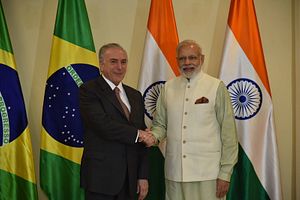Sitting in the mountains of Indochina, India-administered Kashmir is one of the hottest spots and, in all probability, the most densely militarized zone in the world today. Currently around 600,000 Indian troops are stationed in the territory, despite constant allegations of human rights abuses committed by these forces. Thousands of acts of violence and roughness on the part of the military have been reported by international NGOs such as Amnesty International and Human Rights Watch – especially from 1989 onward, when the local population took to the streets and began to fight harder for liberation from India.
As a direct consequence of increasingly large popular demonstrations, in 2016 the region remained under curfew for seven straight months, leading schools, hospitals, banks, and private businesses to close their doors. Despite all the expertise attributed to Delhi in the realm of information technology, internet connections have been interrupted in Indian Kashmir dozens of times over the last months, the digital counterpart to the curfew. Thus, it comes as no surprise that, according to the well-reputed Doctors Without Borders organization, 45 percent of the Kashmiri population is believed to suffer from mental distress.
Yet unlike Tibet or Chechnya, the issue of Kashmir is widely unknown by the people from South America. If China and Russia are recurrently denounced by global media as “the bad guys” when it comes to humanitarian standards, India has most of times been spared from criticism and treated as if it were a champion of multiculturalism and the peaceful integration of races and religions in South Asia.
Why Do Most South Americans Ignore the Kashmiri Question?
An obvious reason for this deep ignorance about India-administered Kashmir in South America is distance, both physical and cultural. Brasília and New Delhi are some 15,000 kilometers apart – or about 24 hours by air travel, if one takes two or three commercial carriers in a row. South Americans are mostly Christians, whereas Indians are Hindus and Kashmiris are Muslims. Language is another paramount barrier: Spanish and Portuguese are widely spoken in this region, while Hindi, Urdu, and English are the major languages used by the populations in South Asia. Taking these factors into consideration, what happens out there hardly echos here – and vice versa. At the end of the day, we seemingly do not share much explicit affinity.
In addition, the kind of coverage provided by Western media outlets appears to be somewhat biased: News agencies such as Reuters, the Associated Press, or France Presse are primed and ready to denounce human rights abuses whenever they happen in China or Russia, but more reluctant to hold India accountable for gross violations. Why is that? The geopolitical argument is that India, a free-market democracy, is seen by many Americans as a convenient check on China’s rise. It is known that New Delhi enjoys both nuclear capabilities and huge demographic potential, not to mention a solid defense relationship with the United States. It appears many Westerners have decided that India’s wrongdoings are to be overlooked in the name of world security.
But there is more: Because India partners with Brazil at IBSA, BRICS and BASIC – three of the brand-new influential groupings whose membership comes from the Global South – diplomats from Brasília have lately shown a tendency to shield their South Asian colleagues. Instead, Brazilian officials act on strictly instrumental grounds, deliberately silencing or simply refusing to deliver any moral statement about other countries’ “domestic issues.” Yet this self-imposed sovereigntist approach has never prevented Brazil from playing the cherry picker and giving opinions about other crippling humanitarian crises – take Venezuela as an example.
When Power Politics Overshadows Human Rights Concerns
South America’s stance toward human rights has arguably been a historical regional asset. Back in the 19th century, South American peoples were already putting into practice some vanguardist ideas and concepts – such as that of diplomatic asylum – which would eventually be adopted elsewhere. Countries like Argentina and Chile have transformed human rights into the cornerstone of their foreign policies after redemocratization. However, now that Brazil roughly accounts for half of South America’s economy, population, and territory, Brasília’s leverage must be taken into account to get an idea of how politics works in this part of the planet.
After all these years of obsequious silence with regard to Indian violations of human rights in Kashmir, Brazil’s Foreign Ministry issued a note on September 16, 2016 with a tepid condemnation of a terrorist attack on an Indian military facility in the region. This note sounds innocuous at the best, or cynical and complacent at worst. Passing a judgment about terrorism in Kashmir while playing dumb to the collateral damage provoked by a massive presence of boots on the ground can only prolong people’s suffering. That is precisely where power politics overshadows human rights concerns.
However consistent with the increasingly authoritarian attitude of Brazil’s President Michel Temer, this approach simply does not level with Brazilian and South American best practices and long-held traditions. There is no diplomatic pragmatism to justify turning a blind eye to systematic human rights abuses and shaking hands with counterparts, thus helping to keep this everyday massacre under cover. The human tragedy in Kashmir must come to a full stop. South America – who would have imagined that? – might have a role to play in naming, shaming, and influencing the situation for the better, considered its humanitarian track record.
Mindful omission about the Kashmiri ordeal is definitely not a decent option for South America’s peace-loving nations – Brazil included.

































